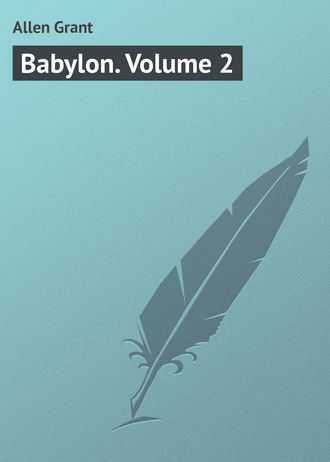 полная версия
полная версияBabylon. Volume 2
Has not humanity rightly pitched, by common consent, for the main theme of all its verse and all its literature, upon this one universal passion, which, for a few short years at least, tinges with true romance and unspoken poetry even the simplest and most commonplace souls?
Colin felt the sadness of parting, too, but by no means so acutely as Minna. The door of fame was opening at last before him; Rome was looming large upon the mental horizon; dreams in marble were crystallising themselves down into future actuality; and in the near fulfilment of his life-long hopes, it was hardly to be expected that he should take the parting to heart so seriously as the little pupil-teacher herself had taken it. Besides, time, in anticipation at least, never looks nearly so long to men as to women. Don’t we all know that a woman will cry her eyes out about a few months’ absence, which to a man seems hardly worth making a fuss about? ‘It’s only for three or four years, you know, Minna,’ Colin said, as lightly as though three or four years were absolutely nothing; and ah me, how long they looked to poor, lonely, heartsick little Minna! She felt almost inclined to give up this up-hill work of teaching and self-education altogether, and return once more to the old fisherman’s cottage away down at Wootton Mandeville. There at least she would have some human sympathies and interests to comfort and sustain her.
But Colin had lots of work to do, getting himself ready for his great start in life; and he hardly entered to the full into little Minna’s fears and troubles. He had to refurbish his entire wardrobe on a scale suited to a gentleman’s servant – Minna was working hard in all her spare hours at making new shirts for him or mending old ones: he had to complete arrangements of all sorts for his eventful journey; and he had to select among his books and drawings which ones should accompany him upon his journey to Rome, and which should be consigned to the omnivorous secondhand book-stall. Milton and Shelley and Bohn’s ‘Æschylus’ he certainly couldn’t do without; they were an integral part of his stock-in-trade as a sculptor, and to have left them behind would have been an irreparable error; but the old dog-eared ‘Euripides’ must go, and the other English translations from the classics would have made his box quite too heavy for Sir Henry to pay excess upon at Continental rates – so Cicolari told him. Still, the Flaxman plates must be got in somewhere, even if Shelley himself had to give way to them; and so must his own designs for his unexecuted statues, those mainstays of his future artistic career. Minna helped him to choose and pack them all, and she was round so often at Cicolari’s in the evening that prim Miss Woollacott said somewhat sharply at last, ‘It seems to me a very good thing, Minna Wroe, that this cousin of yours is going to Rome at last, as you tell me; for even though he’s your only relation in London, I don’t think it’s quite proper or necessary for you to be round at his lodgings every other evening.’ Colin took a few lessons, too, in his future duties, from a gentleman’s gentleman in Regent’s Park. It wasn’t a pleasant thing to do, and he sighed as he put away his books and sketches, and went out to receive his practical instruction from that very supercilious and elegant person; but it had to be done, and so he did it. Colin didn’t care particularly for associating with the gentleman’s gentleman; indeed, he was beginning slowly to realise now how wide a gulf separated the Colin Churchill of the Marylebone Road from the little Colin Churchill of Wootton Mande-ville. He had lived so much by himself since he came to London, he had seen so little of anybody except Minna and Cicolari, and he had been so entirely devoted to art and study, that he had never stopped to gauge his own progress before, and therefore had never fully felt in his own mind how great was the transformation that had insensibly come over him. Without knowing it himself, he had slowly developed from a gentleman’s servant into an artist and a gentleman. And now he was being forced by accident or fate to take upon him once more the position of an ordinary valet.
Indeed, during the month that intervened between Colin’s engagement by Sir Henry Wilberforce and his start for Rome, he wrote to his brother Sam over in America; and, shadowy memory as Sam had long since become to him, though he told him of his projected trip, and enlarged upon his hopes of attaining to the pinnacle of art in Rome, he was so ashamed of his mode of getting there that he said nothing at all upon that point, but just glided easily over the questions of means and method. He didn’t want his thriving brother in America to know that he was going to Rome, with all his high ideals and beautiful dreams, in no better position than as an old man’s valet.
At last the slow month wore itself away gradually for Colin – how swift and short it seemed to Minna! – and the day came when he was really to set out for Paris, on his way to Italy. He was to start with his new master from Charing Cross station, and he had taken possession of his post by anticipation a couple of days earlier. Minna mustn’t be at the station to see him off, of course; that would be unofficial; and if servants indulge in such doubtful luxuries as sweethearts, they must at least take care to meet them at some seemly time or season; but at any rate she could say good-bye to him the evening before, and that was always something. Would he propose to her this time, at last, Minna wondered, or would he go away for that long, long journey, and leave her as much in doubt as ever as to whether he really did or didn’t love her?
‘It won’t be for long, you see, little woman,’ Colin said, kissing away her tears in Regent’s Park, as well as he was able; ‘it won’t be for long, Minna; and then, when we meet again, I shall have come back a real sculptor. What a delightful meeting we shall have, Minna, and how awfully learned and clever you’ll have got by that time! I shall be half afraid to talk to you. But you’ll write to me every week, won’t you, little woman? You’ll promise me that? You must promise me to write to me every week, or at the very least every fortnight.’
It was some little crumb of comfort to Minna that he wanted her to write to him so often. That showed at any rate that he really cared for her just ever such a tiny bit. She wiped her eyes again as she answered, ‘Yes, Colin; I’ll take great care never to miss writing to you.’
‘That’s right, little woman. And look here, you mustn’t mind my giving you them; there’s stamps enough for Italy to last you for a whole twelvemonth – fifty-two of them, Minna, so that it won’t ever be any expense to you; and when those are gone, I’ll send you some others.’
‘Thank you, Colin,’ Minna said, taking them quite simply and naturally. ‘And you’ll write to me, too, won’t you, Colin?’
‘My dear Minna! Why, of course I will. Who else on earth have I got to write to?’
‘And you won’t forget me, Colin?’
‘Forget you, Minna! If ever I forget you, may my right hand forget her cunning – and what more dreadful thing could a sculptor say by way of an imprecation than that, now!’
‘Oh, Colin, don’t! Don’t say so! Suppose it was to come true, you know!’
‘But I don’t mean to forget you, Minna; so it won’t come true. Little woman, I shall think of you always, and have your dear little gipsy face for ever before me. And now, Minna, this time we must really say good-bye. I’m out beyond my time already. Just one more; thank you, darling. Goodbye, good-bye, Minna. Good-bye, dearest. One more. God bless you!’
‘Good-bye, Colin. Good-bye, good-bye. Oh, Colin, my heart is breaking.’
And when that night Minna lay awake in her own bare small room at prim Miss Woollacott’s, she thought it all over once more, and argued the pros and cons of the whole question deliberately to herself with much trepidation. ‘He called me “dearest,” she thought in her sad little mind, ‘and he said he’d never forget me; that looks very much as if he really loved me: but, then, he never asked me whether I loved him or not, and he never proposed to me – no, I’m quite sure he never proposed to me. I should have felt so much easier in my own mind if only before he went away he’d properly proposed to me!’ And then she covered her head with the bed-clothes once more, and sobbed herself to sleep, to dream of Colin.
The very next evening, Colin was at Paris.
CHAPTER XVII. A LITTLE CLOUD LIKE A MAN’S HAND
At the Gare de Lyon, Colin put his master safely into his coupe-lit, and then wandered along the train looking out for a carriage into which he might install himself comfortably for the long journey. All the carriages, as on all French express trains, were first-class; and Colin soon picked one out for himself, with a vacant place next the window. He jumped in and took his seat; and in two minutes more the train was off, and he found himself, at last, beyond the possibility of a doubt, on his way to Rome.
Rome, Rome, Rome! how the very name seemed to bound and thrill through Colin Churchill’s inmost nature! He looked at the little book of coupon tickets which his master had given him; yes, there it was, as clear as daylight, ‘Paris, P.L.M., à Rome;’ not a doubt about it. Rome, Rome, Rome! It had seemed a dream, a fancy, hitherto; and now it was just going to be converted into an actual living reality. He could hardly believe even now that he would ever get there. Would there be an accident at the summit level of the Mont Cenis tunnel, to prevent his ever reaching the goal of his ambition? It almost seemed as if there must be some hitch somewhere, for the idea of actually getting to Rome – that Rome that Cicolari had long ago told him was the capital of art – seemed too glorious and magnificent to be really true, for Colin Churchill.
For a while, the delightful exhilaration of knowing that that very carriage in which he sat was actually going straight through to Rome left him little room to notice the faces or personalities of his fellow-travellers. But as they gradually got well outside the Paris ring, and launched into the country towards Fontainebleau, Colin had leisure to look about him and take stock of the companions he was to have on his way southward. Three of them were Frenchmen only going to Lyon and Marseille —only, Colin thought to himself, naively, for he despised anybody now who was bound for anywhere on earth save the city of Michael Angelo and Canova and Thorwaldsen; but the other two were bound, by the labels on their luggage, for Rome itself. One of them was a tall military-looking gentleman, with a grizzled grey moustache, a Colonel somebody, the hat-box said, but the name was covered by a label; the other, apparently his daughter, was a handsome girl of about twenty, largely built and selfpossessed, like a woman who has lived much in the world from her childhood upward. Colin saw at once, that, unlike little Minna (who had essentially a painter’s face and figure), this graceful full-formed woman was entirely and exquisitely statuesque. The very pose of her arm upon the slight ledge of the window as she leaned out to look at the country was instinct with plastic capabilities. Colin, with his professional interest always uppermost, felt a perfect longing to have up a batch of clay forthwith and model it then and there upon the spot. He watched each new movement and posture so closely, in fact (of course in his capacity as a sculptor only), that the girl herself noticed his evident admiration, and took it sedately like a woman of the world. She didn’t blush and shrink away timidly, as Minna would have done under the same circumstances (though her skin was many shades lighter than Minna’s rich brunette complexion, and would have shown the faintest suspicion of a blush, had one been present, far more readily); she merely observed and accepted Colin’s silent tribute of admiration as her natural due. It made her just a trifle more self-conscious, perhaps, but that was all; indeed, one could hardly say whether even so the somewhat studied attitudes she seemed to be taking up were not really the ones which by long use had become the easiest for her. There are some beautiful women so accustomed to displaying their beauty to the best advantage that they can’t even throw themselves down on a sofa in their own bedrooms without instinctively and automatically assuming a graceful position for all their limbs.
After a while, they fell into a conversation; and Colin, who was the most innocent and unartificial of men, was amused to find that even he, on the spur of the moment, had arrived at a very obvious, worldly-wise principle upon this subject. Wishing to get into a talk with the daughter, he felt half-unconsciously that it wouldn’t do to begin by addressing her outright, but that he should first, with seeming guilelessness, attack her father. A man who is travelling with a pretty girl, in whatever relation, doesn’t like you to begin an acquaintanceship of travel by speaking to her first; he resents your intrusion, and considers you have no right to talk to ladies under his escort. But when you begin by addressing himself, that is quite another matter; lured on by his quiet good sense, or his conversational powers, or his profound knowledge, or whatever else it is that he specially prides himself upon, you are soon launched upon general topics, and then the ladies of the party naturally chime in after a few minutes. To start by addressing him is a compliment to his intelligence or his social qualities; to start by addressing his companion is a distinct slight to himself, at the same time that it displays your own cards far too openly. You can convert him at once either into a valuable ally or into an enemy and a jealous guardian. Of course every other man feels this from his teens; but Colin hadn’t yet mixed much in the world, and he smiled to himself at his acumen in discovering it at all on the first trial.
‘Beautifully wooded country about here,’ he said at the earliest opportunity the military gentleman gave him by laying down his Times (even in France your Englishman will stick to his paper). ‘Not like most of France; so green and fresh-looking. This is Millet’s country, you know; he always works about the outskirts of Fontainebleau.’
‘Ah, indeed, does he?’ the colonel responded, having only a very vague idea floating through his mind that Millet or Millais or something of the sort was the name of some painter fellow or other he had somewhere heard about. ‘He works about Fontainebleau, does he, now? Dear me! How very interesting!’
Whenever people dismiss a subject from their minds by saying ‘How very interesting!’ you know at once they really mean that it doesn’t interest them in the slightest degree, and they don’t want to be bothered by hearing anything more about it; but Colin’s observations upon mankind and the niceties of the English language had not yet carried him to this point of interpretative science, so he took the colonel literally at his word, and went on enthusiastically (for he was a great admirer of the peasant painter whose story was so like his own), ‘Yes, he works at Fontainebleau. It was here, you know, that he painted his Angelus. Have you ever seen the Angelus?’
The colonel fidgeted about in his seat uneasily, and fumbled in a nervous way with the corner of the Times. ‘The Angelus!’ he repeated, meditatively. ‘Ah, yes, the Angelus. Gwen, my dear, have we seen Mr. Millet’s Angelus P Was it in the Academy?’
‘No, papa,’ Gwen answered, smiling sweetly and composedly. ‘We haven’t seen it, and it wasn’t in the Academy. M. Millet is the French painter, you remember, the painter who wears sabots. So delightfully romantic, isn’t it,’ turning to Colin, ‘to be a great painter and yet still to wear sabots?’ This was a very cleverly delivered sentence of Miss Gwen’s, for it was intended first to show that she at least, if not her father, knew who the unknown young artist was talking about (Gwen jumped readily at the conclusion that Colin was an artist), and secondly, to exonerate her papa from culpable ignorance in the artist’s eyes by gently suggesting that a slight confusion of names sufficiently accounted for his obvious blunder. But it was also, quite unintentionally, delivered point-blank at Colin Churchill’s tenderest susceptibilities. This grand young lady, then, so calm and selfpossessed, could sympathise with an artist who had risen, and who, even in the days of his comparative prosperity, still wore sabots. To be sure, Colin didn’t exactly know what sabots were (perhaps the blue blouses which he saw all the French workmen were wearing?), for he was still innocent of all languages but his own, unless one excepts the Italian he had picked up in anticipation from Cicolari; but he guessed at least it was some kind of dress supposed to mark Millet’s peasant origin, and that was quite enough for him. The grand young lady did not despise an artist who had been born in the ranks of the people.
‘Yes,’ he said warmly, ‘it’s very noble of him. Noble not merely that he has risen to paint such pictures as the Gleaners and the Angelus, but that he isn’t ashamed now to own the peasant people he has originally sprung from.’
‘Oh, ah, certainly,’ the colonel replied in a short sharp voice, though the remark was hardly addressed to him. ‘Very creditable of the young man, indeed, not to be ashamed of his humble origin. Very creditable. Very creditable. Gwen, my dear, would you like to see the paper?’
‘No, thank you, papa,’ Gwen answered with another charming smile (fine teeth, too, by Jingo). ‘You know I never care to read in a train in motion. Yes, quite a romantic story, this of Millet’s; and I believe even now he’s horribly poor, isn’t he? he doesn’t sell his pictures.’
‘The highest art,’ Colin said quietly, ‘seldom meets with real recognition during the lifetime of the artist.’
‘You’re a painter yourself?’ asked Gwen, looking up at the handsome young man with close interest.
‘Not a painter; a sculptor; and I’m going to Rome to perfect myself in my art.’
‘A sculptor – to Rome!’ Gwen repeated to herself. ‘Oh, how nice! Why, we’re going to Rome, too, and we shall be able to go all the way together. I’m so glad, for I’m longing to be told all about art and artists.’
Colin smiled. ‘You’re fond of art, then?’ he asked simply.
‘Fond of it is exactly the word,’ Gwen answered. ‘I know very little about it; much less than I should like to do; but I’m intensely interested in it. And a sculptor, too! Do you know, I’ve often met lots of painters, but I never before met a sculptor.’
‘The loss has been theirs,’ Colin put in with professional gravity. ‘You would make a splendid model.’
The young man said it in the innocence of his heart, thinking only what a grand bust of a Semiramis or an Artemisia one might have moulded from Miss Gwen’s full womanly face and figure; but the observation made the colonel shudder with awe and astonishment on his padded cushions. ‘Gwen, my dear,’ he said, feebly interposing for the second time, ‘hadn’t you better change places with me? The draught from the window will be too much for you, I’m afraid.’
‘Oh dear no, thank you, papa; not at all. I haven’t been roasted, you know, for twenty years in the North-West Provinces, till every little breath of air chills me and nips me like a hothouse flower. So you think I would make a good model, do you? Well, that now I call a real compliment, because of course you regard me dispassionately from a sculpturesque point of view. I’ve been told that a great many faces do quite well enough to paint, but that only very few features are regular and calm enough to be worth a sculptor’s notice. Is that so, now?’
‘It is,’ Colin answered, looking straight into her beautiful bold face. ‘For example, some gipsy-looking girls, who are very pretty indeed with their brown skins and bright black eyes, and who make exceedingly taking pictures – Esthers, and Cleopatras, and so forth, you know – are quite useless from the plastic point of view: their good looks depend too much upon colour and upon passing shades of expression, while sculpture of course demands that the features should be almost faultlessly perfect and regular in absolute repose.’
The colonel looked uneasy again, and pulled up his collar nervously. ‘Very fine occupation indeed, a sculptor’s,’ he edged in sideways. ‘Delightful faculty to be able to do the living marble and all that kind of thing; very delightful, really.’ The colonel was always equal to a transparent platitude upon every occasion, and contributed very little else to the general conversation at any time.
‘And so delightful, too, to hear an artist talk about his art,’ Gwen added with a touch of genuine enthusiasm. ‘Do you know, I think I should love to be a sculptor. I should love even to go about and see the studios, and watch the beautiful things growing under your hands. I should love to have my bust taken, just so as to get to know how you do it all. It must be so lovely to see the shape forming itself slowly out of a raw block of marble.’
‘Oh, you know, we don’t do it all in the marble, at first,’ Colin said quickly. ‘It’s rather dirty work, the first modelling. If you come into a sculptor’s studio when he’s working in the clay, you’ll find him all daubed over with bits of mud, just like a common labourer.’
‘How very unpleasant!’ said the colonel coldly. ‘Hardly seems the sort of profession fit for a gentleman – now does it?’
‘Oh, papa, how can you be so dreadful! Why, it’s just beautiful. I should love to see it all. I think in some ways sculpture’s the very finest and noblest art of all – finer and nobler even than painting.’
‘The Greeks thought so,’ Colin assented with quiet assurance; ‘and they say Michael Angelo thought so too. Perhaps I may be prejudiced, but I certainly think so myself. There’s a purity about sculpture which you don’t get about painting or any other alternative form of art. In painting you may admit what is ugly – sparingly, to be sure, but still you may admit it. In sculpture everything must be beautiful. Beauty of pure form, without the accidental aid of colour, is what we aim at. Every limb must be in perfect proportion, every feature in exquisite harmony. Any deformity, any weakness of outline, any mere ungracefulness, you see, militates against that perfection of shape to which sculpture entirely devotes itself. The coldness, hardness, and whiteness of marble make it appeal only to the highest taste; its rigorous self-abnegation in refusing the aid of colour gives it a special claim in the eyes of the purest and truest judges.’
‘Then you don’t like tinted statues?’ the colonel put it. (He knew his ground here, for had he not seen Gibson’s Venus?) ‘Neither do I. I always thought Gibson made a great mistake there.’
‘Gibson was a very great artist,’ Colin replied, curling his lip almost disdainfully, for he felt the absurdity of the colonel’s glibness in condemning the noblest of modern English sculptors off-hand in this easy, mock-critical fashion. ‘Gibson was a very great artist, but I think his Venus was perhaps a step in the wrong direction for all that. Its quite true that the Greeks tinted their statues – ’
‘Bless my soul, you don’t mean to say so! the colonel ejaculated parenthetically.
‘And modern practice was doubtless founded on the mistake of supposing that, because the torsos we dig up are white now, they were white originally. But even the example of the Greeks doesn’t settle every question without appeal. We’ve tried white marble, and found it succeed. We’ve tried tinting, and found it wanting. The fact is, you see, the attention of the eye can’t be distracted. Either it attends to form, or else it attends to colour; rarely and imperfectly to both together. Take a vase. If it’s covered with figures or flowers, our attention’s distracted from the general outline to the painted objects it encloses. If its colouring’s uniform, we think only of the beauty of form, because our attention isn’t distracted from it by conflicting sensations. That’s the long and the short of it, I think. Beauty of form’s a higher taste than beauty of colour – at least, so we sculptors always fancy.’
Colin delivered these remarks as if he intended them for the colonel (though they were really meant for Miss Gwen’s enlightenment), and the colonel was decidedly flattered by the cunning tribute to his tastes and interests thus delicately implied. But Gwen drank in every word the young man said with the deepest attention, and managed to make him go on with his subject till he had warmed to it thoroughly, and had launched out upon his own peculiar theories as to the purpose and function of his chosen art. All along, however, Colin pointed his remarks so cleverly at the colonel, while giving Gwen her fair share of the conversation, that the colonel quite forgot his first suspicions about the young sculptor, and grew gradually quite cordial and friendly in demeanour. So well did they get on together that, by the time they had had lunch out of the colonel’s basket, Colin had given the colonel his ideas as to the heinousness of palming off as sculpture veiled ladies and crying babies (both of which freaks of art, by the way, the colonel had hitherto vastly admired); while the colonel in return had imparted to Colin his famous stories of how he was once nearly killed by a tiger in a jungle at Boolundshuhr in the North-West Provinces, and how he had assisted to burn a fox out in a hunt at Gib., and how he had shot the biggest wapiti ever seen for twenty years in the neighbourhood of Ottawa. All which surprising adventures Colin received with the same sedulous show of polite interest that the colonel had extended in turn to his own talk about pictures and statues.









